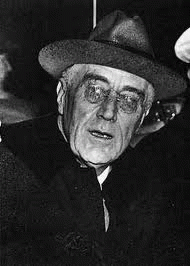Much to my surprise and chagrin nothing happened, nothing changed. As I watched, this administration gave us a health reform bill that abandoned thousands of Americans to gluttonous and predatory health insurers, passed a financial reform bill that did nothing to address the fundamental causes of the crash of 2008, offered to cut Social Security, Medicare and Medicaid, bedrock programs in a progressive society, refused to prosecute any of those who had ordered and employed water boarding even though we had condemned the practice as torture when the Japanese used it early in World War II and completely failed to address unemployment and the astonishing increase in the number of Americans living below the poverty level. By the second year of the Obama administration I came to realize that this Democratic administration and this Democratic party were no longer the one I knew. The one I knew, the one that represented my views had been led by strong men who made hard decisions.
I was born in rural southeastern Missouri in December, 1941, eighteen days after the attack on Pearl Harbor, and was raised by parents who fervently believed that the New Deal had saved them from starvation during the Great Depression. Both had worked on WPA projects and had used that money, augmented by fishing and hunting, to help support their younger brothers and sisters, a fairly common story in that part of the country during the Depression. I was brought up believing that Franklin Roosevelt was second in importance and beatitude only to God and even that ranking was open to discussion. Over the years I've developed some doubts about God but my faith in the basic tenets of the Democratic party have never wavered. To me, the Democratic party represented a belief that, government has a duty not to the monied and the power brokers but to the young, the elderly, the poor and the sick. I ardently believe that if we are one of those who have we need to help those who don't and I believe that the philosophy expressed through the New Deal was best for the greatest number of people in 1933 and it still is.
I think I have had the great fortune to have lived in time of the giants of the Democratic Party. William Jennings Bryan, who had run for president in 1908, died in 1925, sixteen years before I was born but he and his Cross of Gold speech in which he pilloried the Eastern moneyed classes for supporting the gold standard at the expense of the average worker was still living lore in the Democratic Party. Woodrow Wilson had completed first presidency in 1921, twenty years before I was born and he too was still seen as a flesh and blood person, not just a name in a history book. The Civil War had ended only some seventy-five years before I was born and was still a hot-button issue where I grew up.
"For twelve years this Nation was afflicted with hear-nothing, see-nothing, do-nothing Government. The Nation looked to Government but the Government looked away. Nine mocking years with the golden calf and three long years of the scourge! Nine crazy years at the ticker and three long years in the breadlines! Nine mad years of mirage and three long years of despair! Powerful influences strive today to restore that kind of government with its doctrine that that Government is best which is most indifferent.
For nearly four years you have had an Administration which instead of twirling its thumbs has rolled up its sleeves. We will keep our sleeves rolled up.
We had to struggle with the old enemies of peace--business and financial monopoly, speculation, reckless banking, class antagonism, sectionalism, war profiteering.
They had begun to consider the Government of the United States as a mere appendage to their own affairs. We know now that Government by organized money is just as dangerous as Government by organized mob.
(Let's pause here for a moment and ponder the French writer, Alphonse Karr 's famous quote, "plus ça change, plus c'est la même chose." The more things change, the more they stay the same and consider how true they are today).
By 1945 I still wasn't old enough to be aware that President Truman had been called upon to make a terrible decision. Should he use the atomic bomb to end World War II? I have, however, made it a point to study that war and that decision and have come to the same conclusion as many, if not most, historians. Truman was acutely aware of the military, geopolitical and ethical implications of that decision and given the alternatives available to him, invasion or complete and total starvation of the Japanese people, the atomic bomb, as horrible as it was, was the least horrible choice.
In 1951, I was ten years old and while I didn't understand the issues involved I was aware that Truman was being called upon to make another decision crucial to the county and to his political legacy. He had to fire the man who was easily the second most popular war hero in America, Douglas MacArthur, if a tradition of one hundred and fifty years of civilian control of the military was to endure. In early 1951, Truman and his advisors were preparing to start peace talks with North Korea and China. MacArthur was openly critical of Truman and publically threatened to widen the war into China, an act that would have very likely brought Russia into the conflict and triggered World War III. Not content to just defy Truman, MacArthur courted supported in Congress for his wider war.
This wasn't the first time MacArthur had defied civilian authority. In July, 1932, MacArthur had been ordered to remove the encamped "bonus marchers" from their Hooverville encampment. He did so with such great enthusiasm that:
"Hoover sent orders via two officers forbidding MacArthur to cross the Anacostia to clear the
marchers' camp. MacArthur flatly ignored the President's orders, saying he was 'too busy' and could not be 'bothered by people coming down and pretending to bring orders.'"
MacArthur crossed the Anacostia, drove the bonus marchers and six-hundred of their wives and children out of the camp and burned it. He then called a press conference and praised Hoover for giving the order.
Firing MacArthur was one of the most politically unpopular presidential decisions in history. Truman's approval ratings fell precipitously and there were immediate calls for his impeachment. He knew there would be, he knew the price he would pay when he made the decision to do what he knew to be right for America.
I was twenty-one and in college in 1962 and sweated along with the rest of this country for six days in October while John Kennedy faced down Nikita Khrushchev during the Cuban missile crisis. The "cold war" was at it's height and many believed this would be the start of nuclear holocaust. Some in both Russia and America hoped it would be. Kennedy had been in office some nineteen months when he faced this challenge. He would be dead a year later and the country would never again be the same, the future would never again be as bright.
These were the men who represented the ideals of the Democratic Party to which I belonged. I don't recognize many who call themselves Democrats today.
It isn't hard to understand why the Republicans want to destroy the middle class and abandon the elderly and needy. The Republicans are the party of big business, of the Chamber of Commerce, of the wealthy, they always have been and they realize that future of wealth accumulation no longer lies in America; it's now to be found in China and India and any number of Asian and middle eastern countries where cheap labor and little regulation mean obscene profits can still be made. To the Republicans and the plutocrats who control them the middle class is now just an expensive annoyance and a largely unnecessary drain on monies that could be going into their already overstuffed coffers.
(Note: You can view every article as one long page if you sign up as an Advocate Member, or higher).






